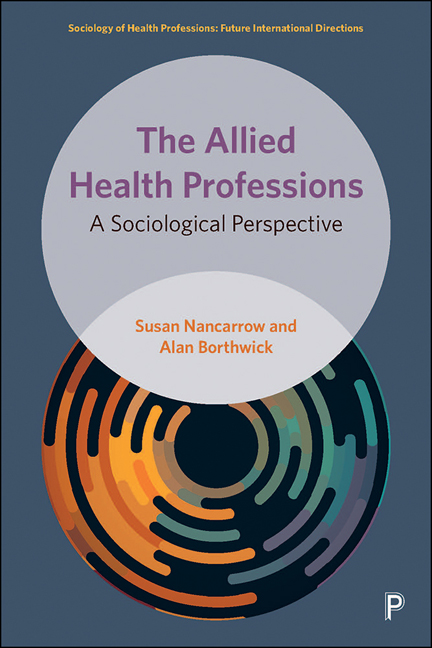Book contents
- Frontmatter
- Contents
- List of abbreviations
- Acknowledgements
- Editors’ overview
- Introduction
- 1 The allied health collective
- 2 Diversity in the allied health professions
- 3 The established allied health professions
- 4 Emerging allied health professions
- 5 The support workforce within the allied health division of labour
- 6 Specialisation in allied health
- 7 Post-professionalism and allied health
- Conclusion
- References
- Index
7 - Post-professionalism and allied health
Published online by Cambridge University Press: 05 January 2022
- Frontmatter
- Contents
- List of abbreviations
- Acknowledgements
- Editors’ overview
- Introduction
- 1 The allied health collective
- 2 Diversity in the allied health professions
- 3 The established allied health professions
- 4 Emerging allied health professions
- 5 The support workforce within the allied health division of labour
- 6 Specialisation in allied health
- 7 Post-professionalism and allied health
- Conclusion
- References
- Index
Summary
This chapter examines the way the allied health workforce is being redefined and reshaped in the 21st century to respond to an increasingly complex healthcare delivery context. Specifically, we explore the way that new types of roles and workers have been systematically engineered through a process of disaggregation of health profession work into discrete tasks that are then reconfigured into new roles (Pain et al, 2018). We use the term ‘post-professional’ to describe this workforce (Randall and Kindiak, 2008; King et al, 2019). These new roles are designed to meet the needs of specific populations and may or may not align with traditional profession-based profiles and values.
This chapter explores the emergence of a growing ‘post-professional’ workforce, which comprises qualified health practitioners from a range of clinical backgrounds (typically allied health and nursing) who adopt new skills, either formally or informally, to become part of a new workforce with common skills and a shared title while also maintaining their primary profession. In other words, a range of existing professions actively codify and commodify new and/or existing tasks that are then adopted by other professional groups to form a new professional identity. These workers could be described as ‘interprofessional practitioners’ (Shield et al, 2006), as opposed to an interdisciplinary team, in which multiple practitioners come together to achieve a common goal. In some cases, these new identities are formalised into new roles, such as the diabetes educator, rural generalist or generalist mental health practitioner. In other cases, the roles may be less formal, such as assessment and case management roles.
The post-professional workforce described here is also distinct from transdisciplinary practice (Thylefors et al, 2005). Transdisciplinary practice assumes a high degree of role interdependence and role overlap between practitioners, and may rely on the transfer of codified tasks between practitioners; however, the practitioner retains their primary professional identity. This differs from the post-professional workforce, in which the worker develops a new, recognised identity based on the transferred tasks, which may be reinforced through training and the adoption of a new, common title.
- Type
- Chapter
- Information
- The Allied Health ProfessionsA Sociological Perspective, pp. 173 - 190Publisher: Bristol University PressPrint publication year: 2021



